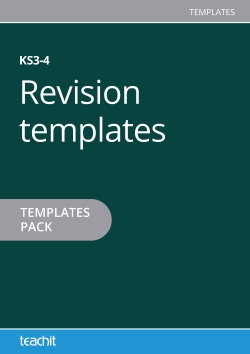Revision templates

These 15 revision templates aim to provide a range of creative, engaging and focused approaches to support students’ revision in any subject.
They can be used for individual, paired, group or classroom revision, and you'll find a range of revision strategies based on metacognition approaches including chunking, spaced practice, interleaving, recall and dual coding.
What's included?
- 15 flexible templates and games including a revision clock and Guess who board, plus adaptable revision resources such as speed dating, mind palace, knowledge trading cards, revision towers and hexagons.
- Includes revision aids, revision timetables, an exam question review and a summary of the most effective revision strategies based on evidence-based research into how we retain information.
What's inside?
Revision templates (pages 4-42)
- Revision clock (pages 4-6)
- Chunk it
- Speed dating
- Guess who
- Fortune teller
- Connect five
- Cube
- Folding flashcards
- Hexagons
- Memory palace
- Petal book
- Grid map
- Knowledge trading cards
- Revision tower
- Revision fan
Revision aids for students (pages 43-50)
- Revision strategies
- Revision review
- Revision timetables
- Question a day - monthly grid
- Exam question review
This is a sample of the teaching notes to accompany the Speed dating revision template.
Speed dating - revision ideas
This flexible peer teaching template can be adapted in a range of ways. It works well if students sit in a line facing each other so they can move one place to the left or right to work with another partner.
Give each student a topic – their ‘secret identity’ – and a couple of minutes to make notes. In pairs, students sit facing each other, and try to find out each other’s topic, asking only yes/no questions for one minute each, before writing down what they think their partner’s topic is on their speed dating card. They then move to work with another partner and repeat. The ‘winner’ is the student to correctly identify the most topics or secret identities.
- Ask the expert – ask half your class to identify a topic they know confidently and could ‘teach’ others. The ‘experts’ put their specialism on a sticky note or on a piece of paper in front of them. The remaining students then self-select an ‘expert’ partner based on the topics they need to revise most.
- For recall revision, students work in pairs on a topic. Each student has three minutes to write down everything they know about the topic (spider diagram, bullet-pointed list, venn diagram etc.). Then they review each other’s notes. Students could use a scoring system (3 for the most comprehensive notes, 2 if both are equally detailed and 1 for underdeveloped notes). Repeat this activity frequently with students moving to work with a different partner on a different topic. At the end, students with a 3 score could teach those who scored 1 on the same topic, or you could encourage students to use their class notes or text books to enhance their lower scoring recall notes. Adapt the template to keep track of topics and scores.
- Give it an exam focus by using past paper questions as your topics – a novel way to work through a past paper.
Ask students to do the activity standing up, rather than sitting down. This will help to keep timings on track, as standing up can be both more energising, and more tiring (!), and students will be keen to move on to their next ‘date’.
All reviews
Have you used this resource?
Review this resource26/07/2021
27/03/2021
26/03/2021
25/03/2021
15/02/2021
03/02/2021
10/01/2021
04/11/2020
28/10/2020
06/10/2020
